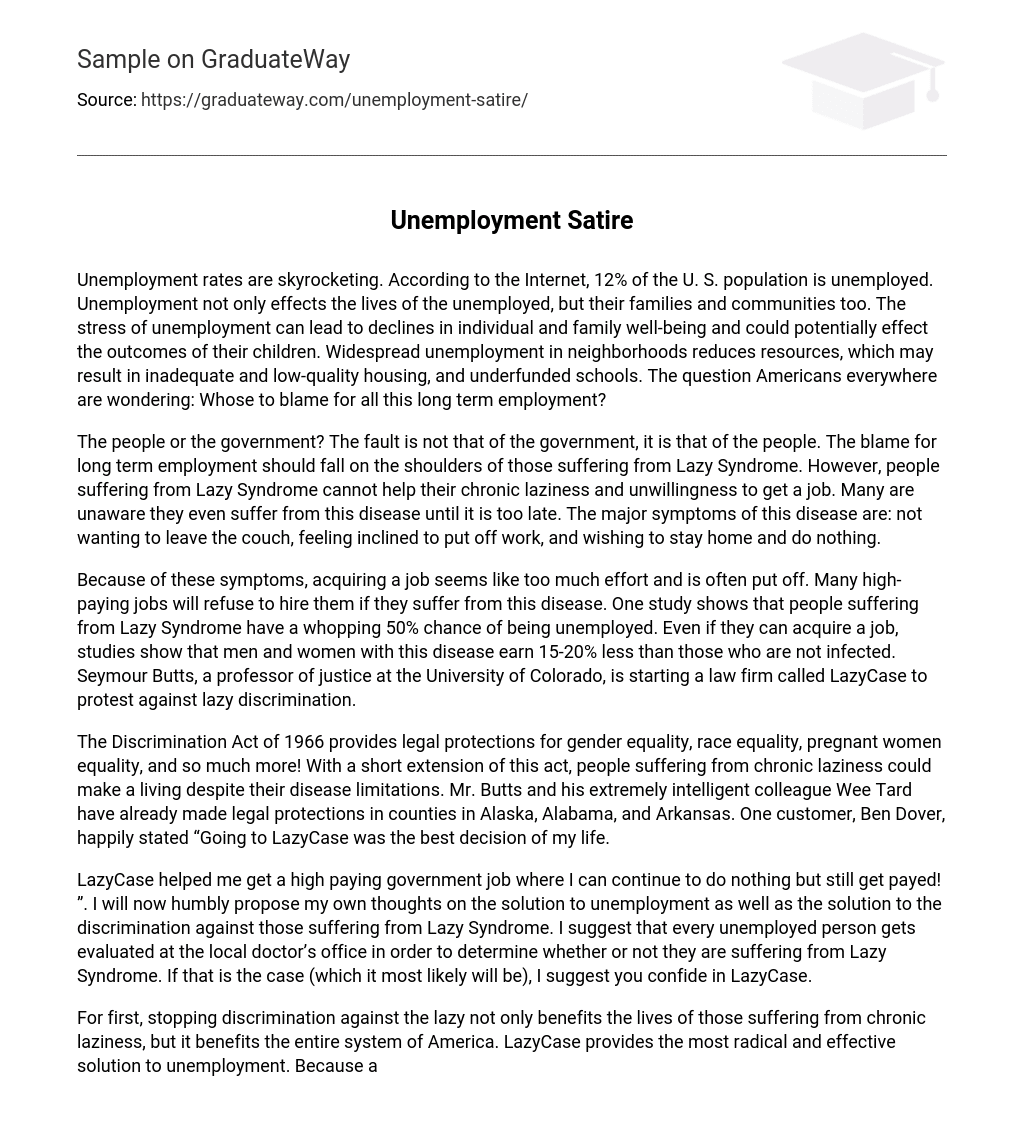Unemployment rates are skyrocketing. According to the Internet, 12% of the U. S. population is unemployed. Unemployment not only effects the lives of the unemployed, but their families and communities too. The stress of unemployment can lead to declines in individual and family well-being and could potentially effect the outcomes of their children. Widespread unemployment in neighborhoods reduces resources, which may result in inadequate and low-quality housing, and underfunded schools. The question Americans everywhere are wondering: Whose to blame for all this long term employment?
The people or the government? The fault is not that of the government, it is that of the people. The blame for long term employment should fall on the shoulders of those suffering from Lazy Syndrome. However, people suffering from Lazy Syndrome cannot help their chronic laziness and unwillingness to get a job. Many are unaware they even suffer from this disease until it is too late. The major symptoms of this disease are: not wanting to leave the couch, feeling inclined to put off work, and wishing to stay home and do nothing.
Because of these symptoms, acquiring a job seems like too much effort and is often put off. Many high-paying jobs will refuse to hire them if they suffer from this disease. One study shows that people suffering from Lazy Syndrome have a whopping 50% chance of being unemployed. Even if they can acquire a job, studies show that men and women with this disease earn 15-20% less than those who are not infected. Seymour Butts, a professor of justice at the University of Colorado, is starting a law firm called LazyCase to protest against lazy discrimination.
The Discrimination Act of 1966 provides legal protections for gender equality, race equality, pregnant women equality, and so much more! With a short extension of this act, people suffering from chronic laziness could make a living despite their disease limitations. Mr. Butts and his extremely intelligent colleague Wee Tard have already made legal protections in counties in Alaska, Alabama, and Arkansas. One customer, Ben Dover, happily stated “Going to LazyCase was the best decision of my life.
LazyCase helped me get a high paying government job where I can continue to do nothing but still get payed! ”. I will now humbly propose my own thoughts on the solution to unemployment as well as the solution to the discrimination against those suffering from Lazy Syndrome. I suggest that every unemployed person gets evaluated at the local doctor’s office in order to determine whether or not they are suffering from Lazy Syndrome. If that is the case (which it most likely will be), I suggest you confide in LazyCase.
For first, stopping discrimination against the lazy not only benefits the lives of those suffering from chronic laziness, but it benefits the entire system of America. LazyCase provides the most radical and effective solution to unemployment. Because a significant amount of people with the lazy disability are unemployed, if given more rights and protections for getting jobs, unemployment rates would drop 70% according to prediction expert Harry Azzol. Secondly, LazyCase would improve the lives of the unemployed.
Individuals who do not face unemployment report better mental health and more life satisfaction than those who experience unemployment and are under a lot of financial stress. Therefore, the world would be filled with much happier people, making it a much better place. Thirdly, LazyCase is extremely affordable (which is necessary because the unemployed are not loaded with cash). For the all time low price of five payments of 99. 89 dollars, Seymour Butts and his employees will personally take a stand at court and get their customer the money (and job) they deserve.
The question everyone is wondering: How? Well, Seymour Butts and Wee Tard have come up with an evolutionary scheme to win at court. New tactics such as being extremely beautiful or using large words to validate your story have produced great results. These tactics are guaranteed to work EVERY TIME, 60 percent of the time! Lastly, LazyCase would solve the problems the unemployed cause for communities. Inadequate and low-quality housing and underfunded schools would no longer be an issue because the unemployed would now have a job to finance these funds.
Studies show that unemployed persons also report less neighborhood belonging than their employed counterparts, which would reduce neighborhood safety and community well-being. With the lazy being provided with jobs, they will likely be too distracted to disrupt the community. LazyCase is a nonprofit organization with the sole purpose of helping the people. None of the employees at LazyCase suffer from Lazy Syndrome so these protections aren’t benefitting the company, they are benefitting your fellow Americans.





